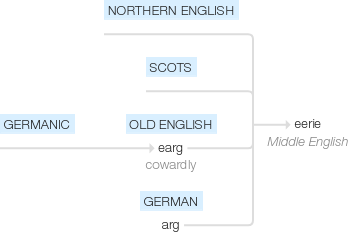Eerie
Middle English (originally northern English and Scots in the sense ‘fearful’): probably from Old English earg ‘cowardly’, of Germanic origin; related to German arg .
wiktionary
From Middle English eri(“fearful”), from Old English earg(“cowardly, fearful”), from Proto-Germanic *argaz. Akin to Scots ergh, argh from the same Old English source. Doublet of argh.
etymonline
eerie (adj.)
also eery, c. 1300, "timid, affected by superstitious fear," north England and Scottish variant of Old English earg "cowardly, fearful, wretched; slow, indolent, useless," from Proto-Germanic *arh- (source also of Old Frisian erg "evil, bad," Middle Dutch arch "bad," Dutch arg, Old High German arg "cowardly, worthless," German arg "bad, wicked," Old Norse argr "unmanly, voluptuous," Swedish arg "malicious"). Sense of "causing fear because of strangeness" is first attested 1792. Finnish arka "cowardly" is a Germanic loan-word.
